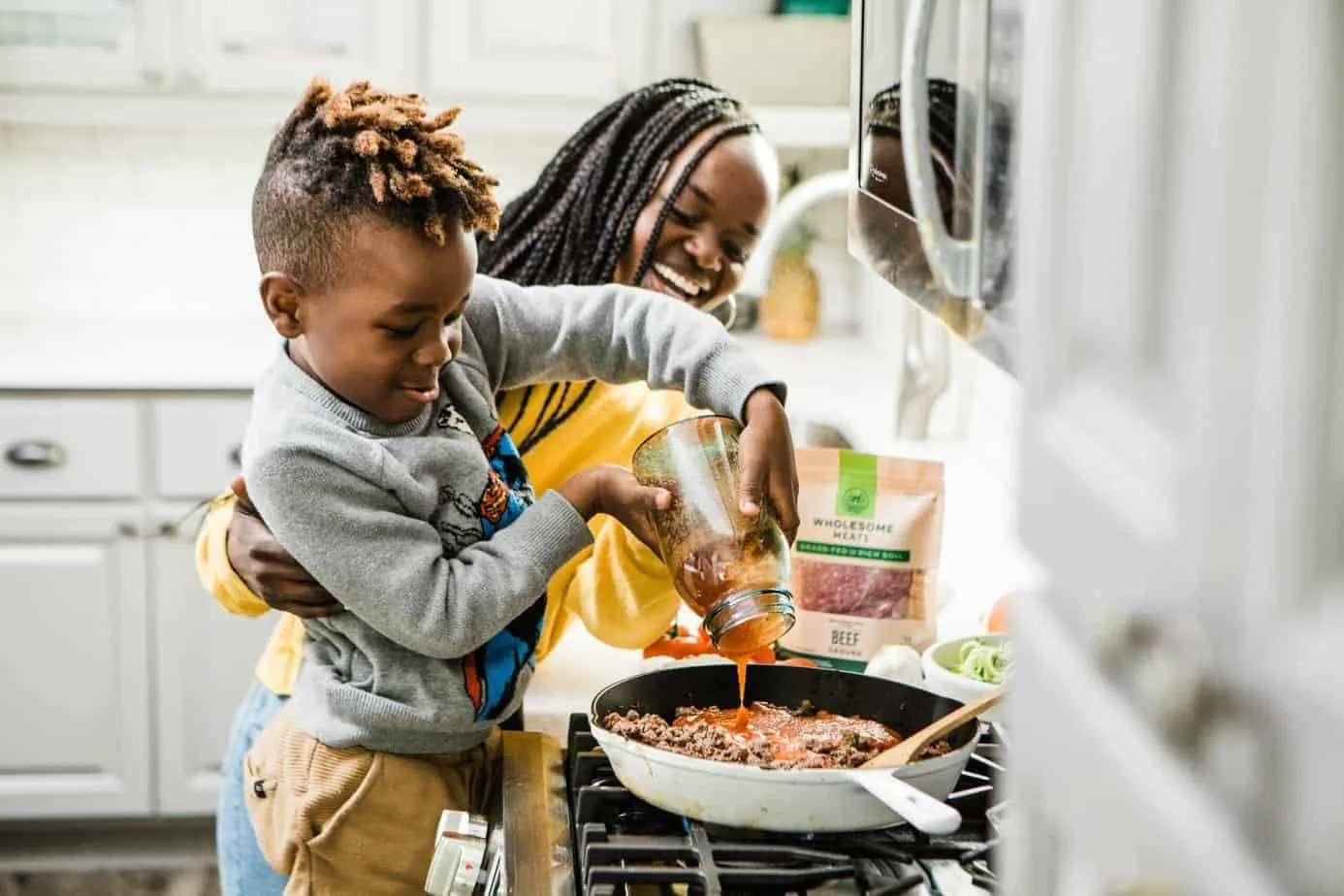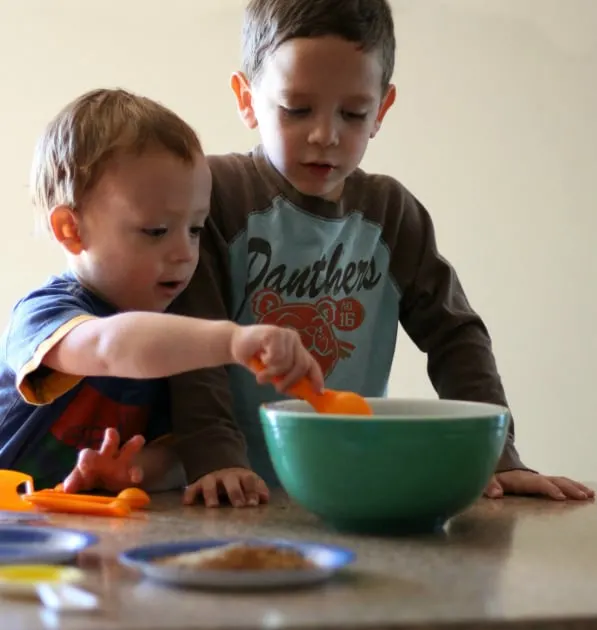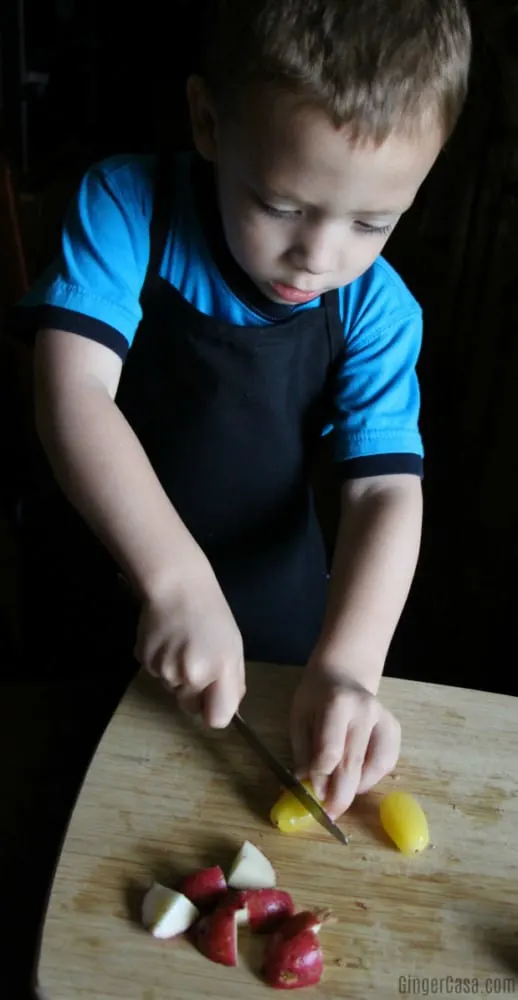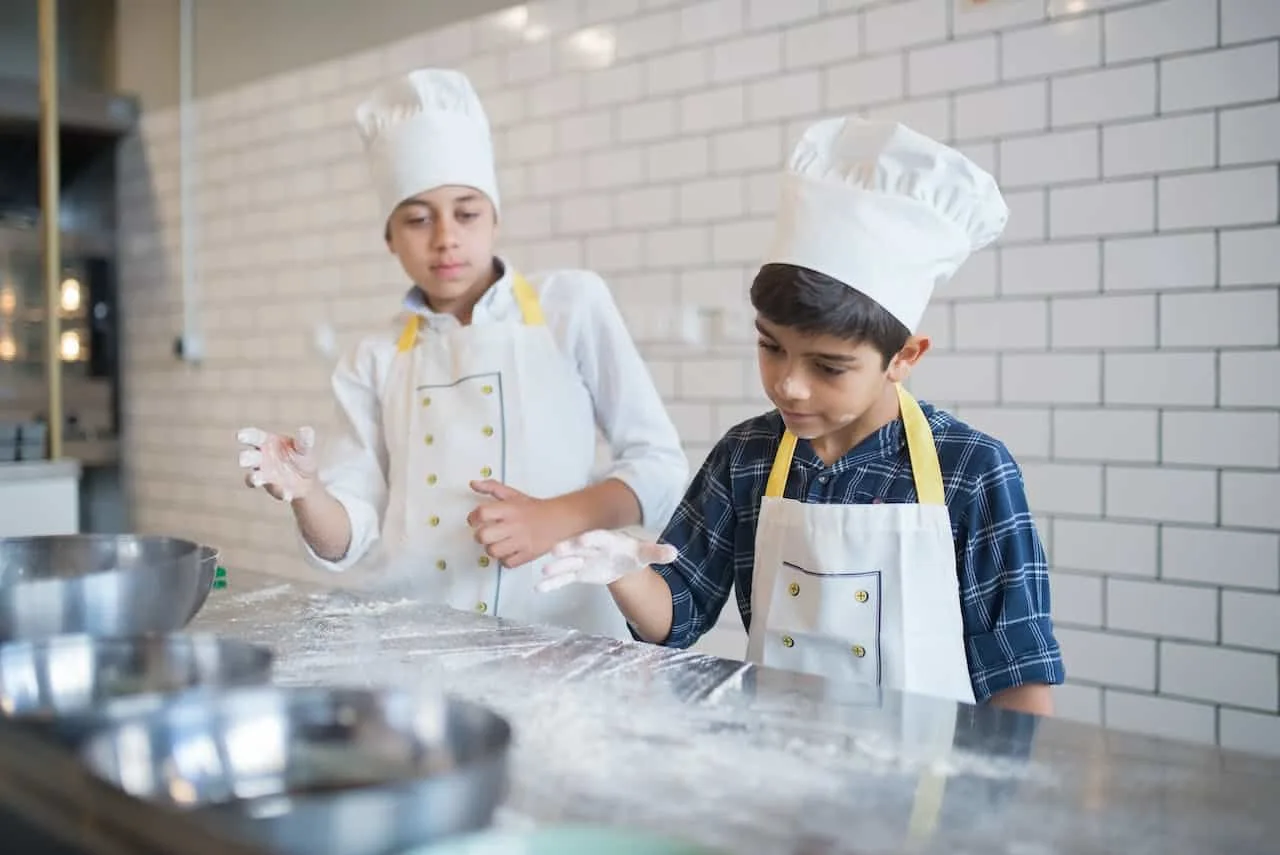Cooking is not just a life skill, it is a joyful and educational experience that can start from a young age. Teaching kids how to cook not only fosters a sense of independence but also introduces them to the basics of nutrition and healthy eating habits.

Whether you have a preschooler or a teenager, cooking can be made fun and kids can be helpful in the kitchen. The basic skills that kids learn as young children can develop into valuable life skills as a young adult beginning their life on their own.
The benefits of teaching kids how to cook
Children who are introduced to cooking at an early age develop a remarkable sense of independence and initiative. Beyond the simple act of preparing a meal, cooking instills a confidence that extends into various aspects of their lives. When kids can navigate the kitchen, measure ingredients, and follow recipes, they experience a tangible form of autonomy. This independence is empowering and contributes to their overall self-esteem.
Cooking also nurtures a sense of initiative in children. As they become familiar with the kitchen environment, they learn to take charge of tasks and make decisions. From choosing recipes to planning meals, kids develop a proactive approach to problem-solving. The process of preparing a dish becomes a canvas for creativity, allowing them to experiment with flavors and textures. This initiative extends beyond the kitchen as children carry the skills of planning and decision-making into other aspects of their lives.
If that is not enough reason to start cooking with your kids, know that cooking teaches kids valuable life skills, such as time management and organization. Following a recipe requires a sequence of steps, each with its own timing, and learning to coordinate these steps helps children understand the importance of structure and planning. This organizational skillset transcends the kitchen, aiding them in school assignments, extracurricular activities, and eventually in their professional lives.
Kids who cook learn and can practice math skills by measuring out ingredients, food safety, and for young kids especially, safety tips like how to keep a safe distance from hot surfaces and to be careful with sharp objects.
Kids who cook not only become capable of feeding themselves but also gain the confidence to take on challenges and solve problems independently. As they witness the tangible results of their efforts in the form of a delicious meal, children learn that with initiative and independence, they can achieve success in various aspects of their lives. They are also more likely to try new foods and feel a sense of accomplishment after cooking a recipe or learning new things in the kitchen.

Ways to encourage kids of all ages to cook
- Storytime Cooking for Preschoolers:
- Choose simple recipes with a story or character theme.
- Create a narrative around the ingredients and the cooking process.
- Use colorful and child-friendly utensils and cookware.
- Creative Cooking for Elementary School Kids:
- Have a "Build Your Own" station with ingredients for tacos, pizzas, or sandwiches.
- Encourage kids to come up with their own recipe variations.
- Science in the Kitchen for Middle Schoolers:
- Explore the science behind cooking – explain how baking soda makes dough rise or why oil and water don't mix.
- Conduct simple experiments, like making a volcano with baking soda and vinegar.
- Introduce more complex recipes involving multiple steps.
- Global Cuisine Adventures for Teens:
- Pick recipes from different cultures to broaden their culinary horizons.
- Teach knife skills and more advanced cooking techniques.
- Emphasize the importance of kitchen safety and cleanliness.
- Family Cooking Challenges:
- Turn cooking into a friendly competition with family cook-offs.
- Assign roles to each family member, creating a collaborative atmosphere.
- Let kids experiment with creating their own signature dishes.
>>Don't miss these cooking with kids recipes<<

Safety in the kitchen
When it comes to introducing kids to the joys of cooking, choosing age-appropriate products is essential to ensure their safety and enjoyment. Here are some suggestions for kitchen tools and products tailored to different age groups:
- Preschoolers (Ages 3 to 5):
- Safety Knives: Look for plastic knives with serrated edges that can cut through soft fruits and vegetables but are safe for little hands.
- Non-breakable mixing bowls: Colorful, nonbreakable, nonslip bowls with wide bases are easy for small hands to handle.
- Cookie Cutters: Fun shapes can make baking cookies a creative and entertaining activity.
- Early Elementary (Ages 6-8):
- Measuring Cups and Spoons: Durable and easy-to-read measuring tools for simple recipes.
- Silicone Baking Mats: These mats provide a non-stick surface for baking and are easy to clean.
- Vegetable Peelers: Child-friendly peelers with a protective guard for learning basic peeling skills.
- Upper Elementary (Ages 9-11):
- Nylon Cooking Utensils: Safe and heat-resistant utensils for stirring, flipping, and serving.
- Electric Mixers: Mixers with speed control for kids to explore baking beyond simple recipes.
- Rolling Pins: Junior-sized rolling pins for rolling out dough with ease.
- Middle Schoolers (Ages 12-14):
- Chef's Knife with Safety Features: Begin introducing more advanced cutting skills with knives designed for older kids.
- Muffin and Cupcake Pans: Ideal for experimenting with baking and portion control.
- Citrus Juicer: Hand-operated or vertical easy-to-use juicers for extracting juice from citrus fruits.
- High Schoolers (Ages 15-18):
- Cooking Thermometer: For learning about proper food temperatures and safe cooking practices.
- Cast Iron Skillet: A durable and versatile option for expanding their cooking repertoire.
- Mixing Bowls with Lids: Great for meal prep and storage, encouraging organization in the kitchen.
- General Products for All Ages:
- Aprons and Chef Hats: Encourage a sense of identity and professionalism in the kitchen.
- Cookbook for Kids: Choose age-appropriate cookbooks with simple and appealing recipes.
- Step Stool or Safe Platform: Ensure kids can reach countertops and stovetops safely.
Remember to always prioritize safety and supervise younger children, especially when introducing new tools. As kids grow older, gradually introduce more advanced utensils and appliances to nurture their evolving culinary skills.

Adding more depth to cooking skills as kids get older
When kids get older and more interested in the cooking process, there are other opportunities to keep them learning and growing in the kitchen. Cooking classes and workshops designed for their age group are a great place to meet new friends. Community centers and local culinary schools also might offer classes for children, so check into that.
Planting a small herb garden or vegetable garden can involve kids in the entire process of the "garden-to-table" experience and can introduce new foods to their cooking. If they want to learn more about the chemistry involved in cooking, you can get them private tutoring.
Cooking is also an important life skill that can teach many things like meal planning, budgeting, and grocery shopping. Parents and guardians can emphasize the importance of a balanced diet, serving size, and portion control.
Getting kids of all ages involved in the kitchen is not just about creating delicious meals; it's about fostering a love for food, learning, and creativity. By tailoring activities to their age and skill level, you can transform cooking into a fun and educational experience that they'll carry with them throughout their lives. So, put on those aprons and start creating culinary memories together!
